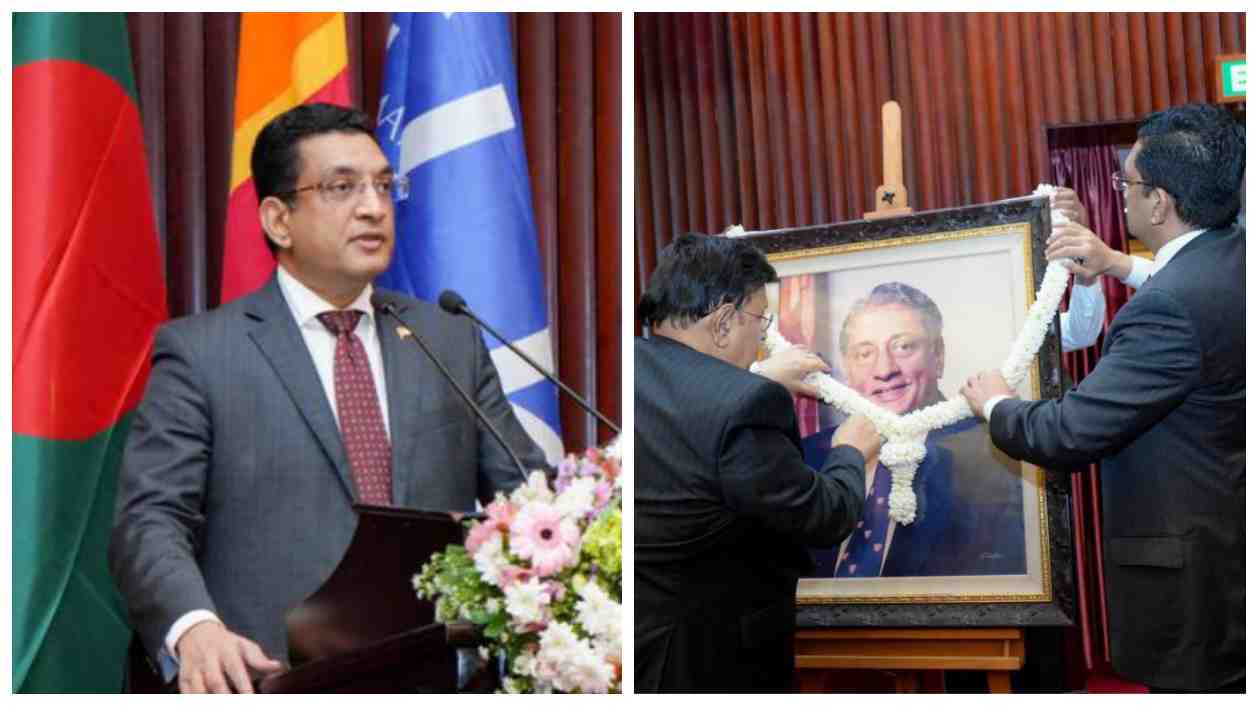
- Lakshman Kadirgamar Memorial Lecture delivered by Foreign Minister Ali Sabry.
My dear friend Abdul Momen, Mrs. Suganthie Kadirgamar & distinguished guests. It is an honour to speak a few words at the memorial oration in honour of Sri Lanka’s most revered diplomat and statesman, Lakshman Kadirgamar.
Born in Colombo in 1932, Lakshman Kadirgamar’s life was marked by a commitment to education, intellectual pursuits and public service. He was a brilliant lawyer, a skilled orator and a courageous human rights advocate. His passion for the law led him to become one of Sri Lanka’s most successful and respected legal minds.
He served as Sri Lanka’s Foreign Minister from 1994 to 2005. He was a man of exceptional talent, courage and vision and I had the privilege of serving as a diplomat during his tenure as Foreign Minister.
A few minutes would hardly be sufficient to speak of his remarkable life, and I have no doubt that all of you are well versed on his achievements be it academic, political or in the field of sport. Therefore, today I want to reflect on how his commitment towards peace, justice, human rights and the fight against terrorism changed the course of Sri Lankan history.
In a world that was increasingly plagued by the threat of terrorism and a nation that was being devastated by it, Lakshman Kadirgamar emerged as a fearless and dedicated leader. A vocal critic of the LTTE and other terrorist organizations, he was a tireless advocate for the cause of peace and justice in Sri Lanka. He understood that terrorism was not just a threat to his country, but to the entire world, and he was determined to do everything in his power to stop it. In working determinedly to isolate the LTTE and other terrorist groups, he emerged a leading voice in the international community on the issue of terrorism.
At the time, there were many who were quick to portray the LTTE as freedom fighters or an organization representing the rights of an oppressed ethnic group. Nothing could have been further from the truth – a faction that forcibly took 12 and 13-year-old children away from their family, thrust a gun and a cyanide capsule on them, and marched them off to an almost certain death could hardly have been considered anything but terrorists. No one was spared of their brutality. The muslims and the tamils in addition to the sinhalese in this country suffered unspeakable atrocities at their hands, and those scars remain to this day.
The war against the LTTE however wasn’t won solely on the battlefields of the north and east– we had our steadfast Foreign Minister in chambers, meeting rooms and halls all over the world fiercely fighting for Sri Lanka with world leaders & diplomats. We cannot speak of winning the war without appreciating the critical role played by Kadirgamar – be it curbing fundraising by the LTTE, cutting of their access to arms or the relentless pressure put on the international community to accept the foregone conclusion of LTTE brutality.
But Kadirgamar was more than just a warrior against terrorism. He was a unifier, a statesman,who always sought to bring people together and find common ground. He believed that the only way to defeat terrorism was to build a strong, united and peaceful nation. A realist, he understood that peace was not possible without the defeat of terrorism. He was a true patriot who fiercely believed in a common Sri Lankan identity the power of unity in diversity.
Never one to advocate being separated along racial or ethnic lines, he famously remarked that “People who live in Sri Lanka, are first and foremost Sri Lankans. Then we have our race and religion,which is something given to us at birth. We have to live in Sri Lanka tolerating all races and religions” That is not to say that religion or race was something to be ashamed of – on the contrary, diverse faiths and ethnicities were to be celebrated as it was essential to find unity in diversity.
His firm conviction, that the only way forward for Sri Lanka was the ensuring of unity,
compassion and human dignity has stood the test of time. A lot of work was done in the
aftermath of the conflict to repair what was so badly damaged – we took the children out of the battlefield and put them in classrooms. We took away the gun and the cyanide capsule round their neck and replaced it with a pen and paper. We gave former fighters the opportunities in life which they so richly deserved and reintegrated them into society.
Yet, there is more work to be done. We have much to achieve in the realms of nation building,reconciliation and creating national unity through a single Sri Lankan identity. As we reflect on the legacy of Lakshman Kadirgamar, we must remember that for all his hard work on a global level, he fought just as fiercely fought at home for the uplifting of human rights, the better treatment of communities and a higher quality of life for all Sri Lankans.
Kadirgamar paid a heavy price for his belief in a better Sri Lanka when he was tragically
assassinated in 2005. If we are to honour his life, his work and his ultimate sacrifice for our
nation we must strive to make his vision of a united Sri Lanka a reality. We must put aside our stubborn vanity borne of ethnicity, race and religion and come together as one nation.
A nation of ‘Sri Lankans’ where our differences are put aside and we strive to give our best for our country.
That, I believe, is the highest tribute we can pay the ‘cake that was baked at home’
Thank you.


